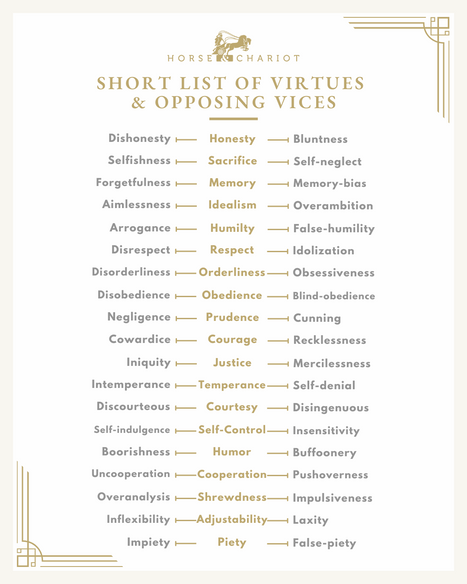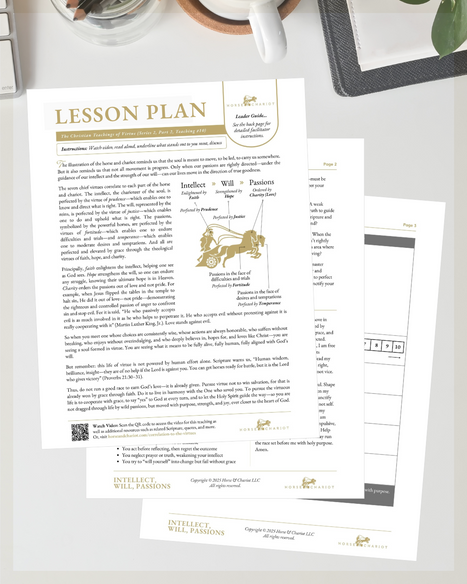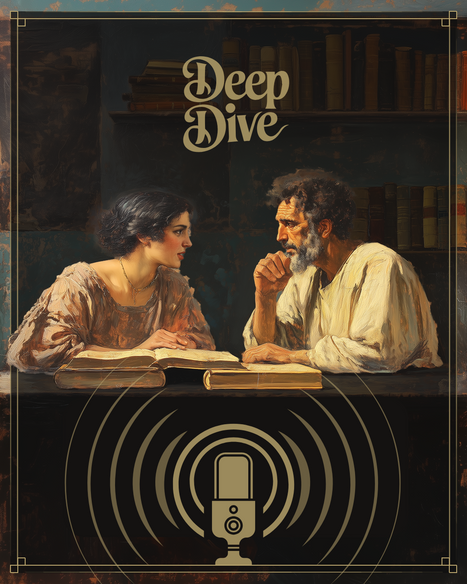All Series > Virtue & Vice > Part 3
The Golden Mean
(Series 3, Part 3, Teaching #19)
Watch: On YouTube
The Golden Mean
For every virtue, there are two opposing extremes of vice—one from deficiency, the other from disorder. Virtue, then, is the golden mean—the balanced, rightly ordered response between those extremes. It is the narrow path between the margins of vice.
Take courage, for example. On one side lies cowardice—a deficiency of courage that causes one to shrink from difficulty, avoid discomfort, and abandon duty. On the other side lies recklessness—a disorder of courage, untethered from wisdom, that throws one into danger without cause or counsel. Courage, rightly ordered, is the golden mean between the two. It knows when to advance, when to wait, and when to stand firm. It is the steady hand under fire, neither ruled by fear nor blinded by bravado.
Imagine standing at the edge of a battlefield. Courage would move you to rise with your fellow soldiers and run toward the fight, even though fear beats in your chest. Cowardice would paralyze you, holding you back. Recklessness would drive you to charge in alone, unarmed and unwise, with no chance of victory. But the golden mean walks in step with truth, timing, and grace.
This principle applies not only to courage, but to every virtue. Righteousness, for example, lies between unrighteousness and self-righteousness. Generosity lies between stinginess and extravagance. Patience lies between impatience and indifference. Self-control lies between self-indulgence and self-denial. Contentment lies between discontentment and complacency. The virtuous life is not an extreme on either end—but the steady, centered walk of one who follows the Way.
This is why virtue requires both strength and discernment. It’s not merely doing “the right thing,” but doing it in the right way, at the right time, with the right intention. This balance—this golden mean—is not easy to maintain. In fact, without the guidance of the Holy Spirit, it’s impossible. But with grace, it becomes the rhythm of a soul in harmony with God.
The world will often pull you toward the extremes. It will applaud pride and call it confidence, or excuse recklessness and call it bravery. But do not be deceived. The narrow path is not loud or flashy. It is quiet, resolute, and less traveled. “For the gate is narrow and the road is hard that leads to life, and there are few who find it” (Matthew 7:14). And yet, that narrow path—the golden mean—is the very road to holiness.
So ask yourself: Where have I drifted into the margins? Have I let fear hold me back? Have I allowed zeal to outrun wisdom? Am I pursuing the balance of virtue, or swinging between extremes?
Virtue is the pursuit of order. It brings peace to the passions, clarity to the intellect, and strength to the will. It is the mean between chaos and stagnation, deficiency and disorder, noise and silence. And you do not walk it alone. The balance of virtue is only possible through the strength of grace. The Holy Spirit is with you—guiding, correcting, and empowering you to stay the course.
Walk the golden mean. And you will walk with Christ.

Scroll down for the lesson plan and other related resources associated with this teaching.
Copyright © 2022 Horse & Chariot. All rights reserved.
New teachings like this are released often. Subscribe free and never miss a teaching!
Resources

Visual Resource
Illustration highlighting a short list of virtues (the golden mean) and their opposing vices.

Free Lesson Plan
Perfect for small groups, families, classrooms, or personal reflection.

5-Minute Deep Dive
Deepen your understanding of this source teaching by listening to a brief podcast-style discussion (powered by Google Gemini).
Related Scripture
“For the gate is narrow and the road is hard that leads to life, and there are few who find it” — Matthew 7:14
"I say, then: live by the Spirit and you will certainly not gratify the desire of the flesh. For the flesh has desires against the Spirit, and the Spirit against the flesh; these are opposed to each other, so that you may not do what you want. But if you are guided by the Spirit, you are not under the law. Now the works of the flesh are obvious: immorality, impurity, licentiousness, idolatry, sorcery, hatreds, rivalry, jealousy, outbursts of fury, acts of selfishness, dissensions, factions, occasions of envy, drinking bouts, orgies, and the like. I warn you, as I warned you before, that those who do such things will not inherit the kingdom of God. In contrast, the fruit of the Spirit is love, joy, peace, patience, kindness, generosity, faithfulness, gentleness, self-control. Against such there is no law. Now those who belong to Christ [Jesus] have crucified their flesh with its passions and desires. If we live in the Spirit, let us also follow the Spirit. Let us not be conceited, provoking one another, envious of one another." — Galatians 5:16-26 (NABRE)
“So turn from youthful desires and pursue righteousness, faith, love, and peace, along with those who call on the Lord with purity of heart.” — 2 Timothy 2:22 (NABRE)
“For just as through the disobedience of the one man the many were made sinners, so also through the obedience of the one man the many will be made righteous.” — Romans 5:19 (NABRE)
“Every test that you have experienced is the kind that normally comes to people. But God keeps his promise, and he will not allow you to be tested beyond your power to remain firm; at the time you are put to the test, he will give you the strength to endure it, and so provide you with a way out.” — 1 Corinthians 10:13 (GNT)
“Do to others whatever you would have them do to you…[the Golden Rule]” — Matthew 7:12 (NABRE)
“Like obedient children, do not act in compliance with the desires of your former ignorance but, as he who called you is holy, be holy yourselves in every aspect of your conduct…” — 1 Peter 1:14-15 (NABRE)
“Let love be sincere; hate what is evil, hold on to what is good; love one another with mutual affection; anticipate one another in showing honor. Do not grow slack in zeal, be fervent in spirit, serve the Lord. Rejoice in hope, endure in affliction, persevere in prayer. Contribute to the needs of the holy ones, exercise hospitality. Bless those who persecute [you], bless and do not curse them. Rejoice with those who rejoice, weep with those who weep. Have the same regard for one another; do not be haughty but associate with the lowly; do not be wise in your own estimation. Do not repay anyone evil for evil; be concerned for what is noble in the sight of all. If possible, on your part, live at peace with all. Beloved, do not look for revenge but leave room for the wrath; for it is written, “Vengeance is mine, I will repay, says the Lord.” Rather, “if your enemy is hungry, feed him; if he is thirsty, give him something to drink; for by so doing you will heap burning coals upon his head.” Do not be conquered by evil but conquer evil with good.” — Romans 12:9-21 (NABRE)
“Do not be fooled. ‘Bad companions ruin good character.’ Come back to your right senses and stop your sinful ways...” — 1 Corinthians 15:33-34 (GNT)
"Let your eyes look straight ahead and your gaze be focused forward. Survey the path for your feet, and all your ways will be sure. Turn neither to right nor to left, keep your foot far from evil." — Proverbs 4:25-27 (NABRE)
Related Quotes
“It can only ruin your life if it ruins your character.” — Marcus Aurelius
“Virtue is the golden mean between two vices, the one of excess and the other of deficiency.” — Aristotle
“Some vices miss what is right because they are deficient, others because they are excessive, in feelings or in actions, while virtue finds and chooses the mean.” — Aristotle
“Do not think you have gained a virtue unless you have first been tried by its opposite.” — St. Teresa of Avila
“Excellence or virtue is a settled disposition of the mind that determines our choice of actions and emotions and consists essentially in observing the mean relative to us ... a mean between two vices, that which depends on excess and that which depends on defect.” — Aristotle
“For both excessive and insufficient exercise destroy one's strength, and both eating and drinking too much or too little destroy health, whereas the right quantity produces, increases and preserves it. So it is the same with temperance, courage and the other virtues. This much then, is clear: in all our conduct it is the mean that is to be commended.” — Aristotle
“Temperance is a mean with regard to pleasures.” — Aristotle
“Temperance and bravery, then, are ruined by excess and deficiency, but preserved by the mean.” — Aristotle
"He, that holds fast the golden mean, And lives contentedly between the little and the great, Feels not the wants that pinch the poor, nor plagues that haunt the rich man's door." — Horace
“If then, as we say, good craftsmen look to the mean as they work, and if virtue, like nature, is more accurate and better than any form of art, it will follow that virtue has the quality of hitting the mean. I refer to moral virtue, for this is concerned with emotions and actions, in which one can have excess or deficiency or a due mean.” — Aristotle
“It takes a vice to check a vice, and virtue is the by-product of a stalemate between opposite vices.” — Eric Hoffer
“It is possible to fail in many ways (for evil belongs to the class of the unlimited and good to that of the limited), while to succeed is possible only in one way (for which reason also one is easy and the other difficult—to miss the mark easy, to hit it difficult); for these reasons also, then, excess and defect are characteristic of vice, and the mean of virtue; For men are good in but one way, but bad in many.” — Aristotle
“Not every action or emotion however admits of the observance of a due mean. Indeed the very names of some directly imply evil, for instance malice, shamelessness, envy, and, of actions, adultery, theft, murder. All these and similar actions and feelings are blamed as being bad in themselves; it is not the excess or deficiency of them that we blame. It is impossible therefore ever to go right in regard to them - one must always be wrong.” — Aristotle

Never miss a teaching — get all new teachings of virtue sent to your inbox free!
